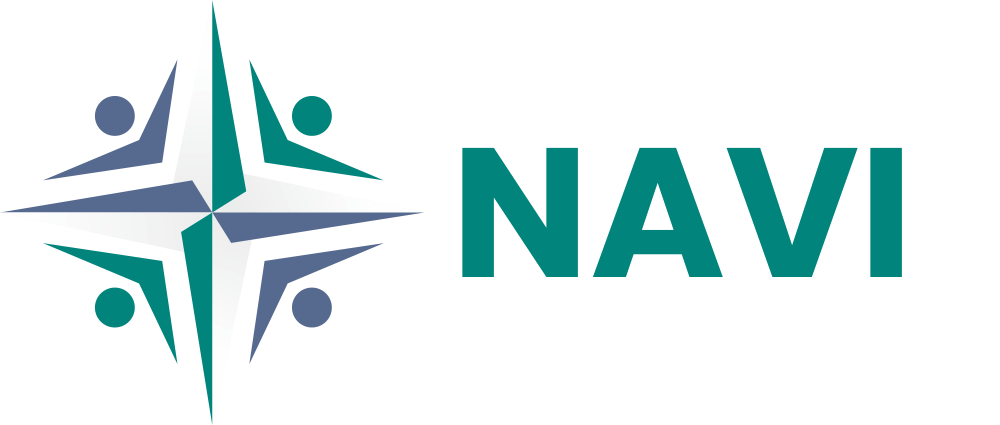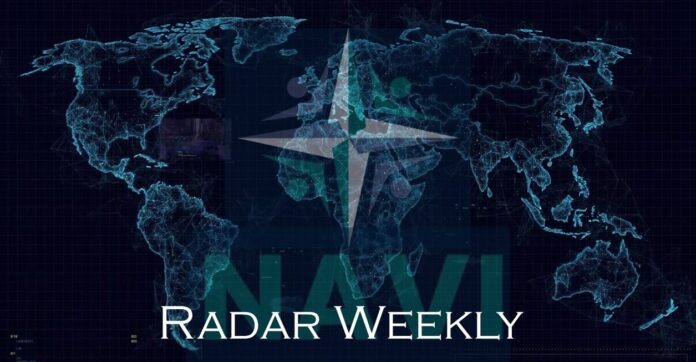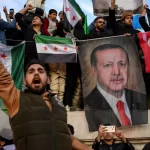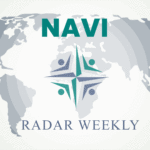Focus Point: Regional Security- NATO
Swedish flag raised at NATO Headquarters | NATO
nato.int | 11.03.2024

The Swedish flag was raised at NATO Headquarters for the first time on Monday (11 March 2024) in a ceremony to mark the country’s membership of the Alliance. Sweden became NATO’s 32nd Ally on 7 March upon depositing its instrument of accession to the North Atlantic Treaty with the United States government in Washington D.C.
The Secretary General welcomed Prime Minister Ulf Kristersson to NATO Headquarters for a flag-raising ceremony to mark Sweden’s accession. Speaking ahead of the ceremony, the Secretary General thanked Prime Minister Kristersson for his strong personal leadership and commitment to leading Sweden into NATO.
The Secretary General said: “Sweden has taken its rightful place at NATO’s table under the shield of Article 5 protection – the ultimate guarantee of our freedom and security. All for one and one for all.”
Sweden’s flag was hoisted to join the flags of the other 31 Allies, as the Swedish national anthem and the NATO hymn were played. Flag-raising ceremonies took place simultaneously at Allied Command Operations (SHAPE) in Mons (Belgium) and Allied Command Transformation in Norfolk, Virginia (United States). Standing alongside Prime Minister Kristersson, the Secretary General said: “Sweden’s accession shows again that NATO’s door remains open. No one can close it. Every nation has the right to choose its own path, and we all choose the path of freedom and democracy.”
Noting that NATO will mark its 75th anniversary this year, Mr Stoltenberg underlined that the transatlantic bond between Europe and North America has ensured our freedom and security. Sweden will help to build an even stronger NATO at a critical time for Euro-Atlantic security, he said, adding that “joining NATO is good for Sweden, good for stability in the North, and good for the security of our whole Alliance.”
Ceremony to mark the accession of Sweden to NATO
Focus Point: Regional Security- European Security
Switzerland: Europe’s critical vulnerability | Brookings
Constanze Stelzenmüller | 12.03.2024

Recently, Swiss journalist Roger de Weck told the Neue Zürcher Zeitung that his country is “the niche […] where things happen that are forbidden elsewhere.” The Swiss criminal law professor and corruption hunter Mark Pieth describes this somewhat whimsically as the “pirates’ harbor.” The aspects of Swiss politics they are referring to are well-known and regularly scrutinized in the established Swiss media. Their critique goes well beyond an understanding of neutrality that is increasingly alienating Switzerland’s neighbors and which—by way of example—prohibits even democratic neighbors from passing on armaments produced by former Swiss companies to a Ukraine fighting against a brutal aggressor.
But in the context of Europe’s greatest security crisis since 1945, it allows the Kremlin to undermine Western sanctions (which Switzerland is at least participating in), thereby potentially prolonging the war. In geo-economic terms, this makes Switzerland a critical vulnerability in Europe’s security policy.
Switzerland, which likes to see itself as a storm-tossed island of the blessed, is in reality the world’s largest (and very tolerant) offshore financial center. It has long been a hub for the global commodities trade and a huge magnet for seemingly endless flows of less-than-licit data, money, goods, and people that make up the dark underbelly of globalization. All of this is served by a dense and anything-but-transparent network of lawyers, consultants, and brokers.
Even before the Russian attack on Ukraine on February 24, 2022, this state of affairs was a nuisance to many other states. But in the context of Europe’s greatest security crisis since 1945, it allows the Kremlin to undermine Western sanctions (which Switzerland is at least participating in), thereby potentially prolonging the war. In geo-economic terms, this makes Switzerland a critical vulnerability in Europe’s security policy. Read more…
Focus Point: Security and Defense Policy- Russia-Ukraine War
Putin Says Russia Has Built Rare Nuclear Weapons | Newsweek
Jon Jackson | 13.03.2024

Throughout the course of the war that Putin launched on Ukraine on February 24, 2022, he and other Kremlin officials have frequently made public mentions of Russia’s nuclear power. Western observers have accused Russia of nuclear saber-rattling for such talk, saying the threats are made to discourage outside support for Kyiv.
“Our triad, the nuclear triad, it is more modern than any other triad. Only we and the Americans actually have such triads. And we have advanced much more here,” Putin said during a Wednesday interview that aired on Russian state television, according to a translation by Agence France-Presse (AFP).
The Russian leader then discussed the possibility of using nuclear weapons should his nation’s sovereignty be threatened. “We are ready to use weapons, including any weapons—including the [nuclear] weapons you mentioned—if it is a question of the existence of the Russian state or damage to our sovereignty and independence,” Putin said. Read more…
Focus Point: Regional Security- NATO
8th NATO military staff talks with China | NATO
nato.int | 13.03.2024
On 13 March 2024, the eighth iteration of the annual NATO-China Military Staff Talks was held in Beijing.
Headed by the Director of the Cooperative Security Division, Major General Dacian-Tiberiu Șerban, a NATO delegation met with Major General Yao Qin, Deputy Director of the Office for International Military Cooperation and his staff.
Topics covered at the meeting included: the global and regional security landscapes, with emphasis on Russia’s illegal invasion of Ukraine; maritime security; and issues of common concern.
Both sides agreed on the value of continued engagement. Major General Șerban underlined how the staff talks are mutually beneficial for all parties involved, that they represent a valuable forum to address shared concerns and interests and to foster transparency. Read more…
Focus Point: Emerging Technologies & Data- Artificial Intelligence
Artificial Intelligence Act: MEPs adopt landmark law | European Parliament
European Parliament | 13.03.2024

On Wednesday, Parliament approved the Artificial Intelligence Act that ensures safety and compliance with fundamental rights, while boosting innovation.
The regulation, agreed in negotiations with member states in December 2023, was endorsed by MEPs with 523 votes in favour, 46 against and 49 abstentions.
It aims to protect fundamental rights, democracy, the rule of law and environmental sustainability from high-risk AI, while boosting innovation and establishing Europe as a leader in the field. The regulation establishes obligations for AI based on its potential risks and level of impact.
Next steps
The regulation is still subject to a final lawyer-linguist check and is expected to be finally adopted before the end of the legislature (through the so-called corrigendum procedure). The law also needs to be formally endorsed by the Council.
It will enter into force twenty days after its publication in the official Journal, and be fully applicable 24 months after its entry into force, except for: bans on prohibited practises, which will apply six months after the entry into force date; codes of practise (nine months after entry into force); general-purpose AI rules including governance (12 months after entry into force); and obligations for high-risk systems (36 months).
Background
The Artificial Intelligence Act responds directly to citizens’ proposals from the Conference on the Future of Europe (COFE), most concretely to proposal 12(10) on enhancing EU’s competitiveness in strategic sectors, proposal 33(5) on a safe and trustworthy society, including countering disinformation and ensuring humans are ultimately in control, proposal 35 on promoting digital innovation, (3) while ensuring human oversight and (8) trustworthy and responsible use of AI, setting safeguards and ensuring transparency, and proposal 37 (3) on using AI and digital tools to improve citizens’ access to information, including persons with disabilities. Read more…
Focus Point: Regional Security- NATO
NATO Secretary General launches his Annual Report for 2023 | NATO
nato.int | Report | 14.03.2024

NATO Secretary General Jens Stoltenberg launched his annual report for 2023 on Thursday (14 March 2024), which covers all aspects of the Alliance’s work over the past year.
Mr Stoltenberg said “the data is clear. Public support for NATO is extremely strong on both sides of the Atlantic.
Mr Stoltenberg said “the data is clear. Public support for NATO is extremely strong on both sides of the Atlantic. If a vote were held today, an overwhelming majority of citizens across Allied countries would vote in favour of NATO.”
In 2023, Allies continued to provide unprecedented levels of support to Ukraine. Mr Stoltenberg said, “for the first time, a number of Allies also sent long-range systems, UK Storm Shadow and French SCALP missiles and Allies agreed to send F-16 aircraft.” He added that several Allies have now signed bilateral security agreements with Ukraine.
“The Ukrainians are not running out of courage. They are running out of ammunition… This is a critical moment and it would be a grave, historic mistake to allow Putin to prevail. We cannot allow authoritarian leaders to get their way by using force.”
In 2024, Mr Stoltenberg highlighted that NATO Allies in Europe will invest a total of $470 billion in defence, amounting to 2% of their combined GDP for the first time. “This year, two-thirds of Allies will meet the 2% target, up from just three Allies in 2014.” he said.
The Secretary General highlighted that “since then, NATO has agreed contracts worth tens of billions of dollars for ammunition and key capabilities.”
NATO has also further deepened its relations with partners in the Indo-Pacific, and the European Union.
The Secretary General also noted that NATO’s Defence Innovation Accelerator for the North Atlantic – DIANA – is doubling its network of accelerators and test centres. These world-class sites on both sides of the Atlantic will focus on solving defence and security challenges, and sharpening NATO’s technological edge in areas ranging from artificial intelligence and cyber, to 5G, hypersonics, and autonomous systems. The Secretary General’s Annual Report for 2023 details NATO’s work and achievements throughout the year. Read more…
Focus Point: Regional Security- NATO
Defence expenditure of NATO countries (2014-2023) | NATO
nato.int | Report | 14.03.2024

NATO collects defence expenditure data from Allies and publishes it on a regular basis. Each Ally’s Ministry of Defence reports current and estimated future defence expenditure according to an agreed definition. The amounts represent payments by a national government that have been or will be made during the course of the fiscal year to meet the needs of its armed forces, those of Allies or of the Alliance.
In the figures and tables that follow, NATO also uses economic and demographic information available from the Directorate-General for Economic and Financial Affairs of the European Commission (DG ECFIN) and the Organisation for Economic Co-operation and Development (OECD).
In view of differences between these sources and national GDP forecasts, and also the definition of NATO defence expenditure and national definitions, the figures shown in this report may considerably diverge from those that are referenced by media, published by national authorities or given in national budgets. Equipment expenditure includes expenditure on major equipment as well as on research and development devoted to major equipment. Personnel expenditure includes pensions paid to retirees.
The cut-off date for information used in this report was 7 February 2024. Figures for 2023 are estimates. Read more…
Focus Point: Regional Security- NATO
Allied perceptions on security, defence and NATO in 2023 | NATO
nato.int | Report | 14.03.2024

In 2023, NATO continued to monitor Allied citizens’ perceptions on defence and security. Findings show significant agreement that NATO membership makes foreign attack less likely (61 per cent, consistent with 2022), and support for increased defence spending has risen by five percentage points (40 per cent in 2023; 35 per cent in 2022). A majority of Allied respondents agree with their country continuing to provide support to Ukraine (63 per cent).
About the study

Coverage: 31 NATO Allies plus Sweden: general population over 18 years of age. When this survey was conducted, Sweden was not a NATO member. Data from Sweden are not included in the calculation of the NATO total.
Sample size: In all countries polled online, a sample of at least 1,000 respondents per country was achieved. In countries surveyed by telephone, at least 500 individuals per country were interviewed. In total, 30,925 interviews were conducted.
Methodology: Online interviews, with quotas applied on gender, age and region. In Albania and Montenegro, interviews were conducted via telephone and random sampling.
All data have been weighted according to the latest population statistics.
Total data are calculated based on population distribution in the 31 Allied countries. Data from Sweden are not included in the calculation of the NATO total. When this survey was conducted, Sweden was a NATO Invitee. It became a NATO Ally on 7 March 2024.
Fieldwork period: 1 November – 6 December 2023.
Margin of error: The survey uses non-probability sampling. The indicative margin of error is ± 3%.
Trend data: 2022 data are based on interviews conducted among 30,993 interviews in the 30 NATO member countries between 7 and 29 November 2022. 2021 data are based on interviews conducted by Kantar among 28,909 adults in the 30 NATO member countries between 12 November and 2 December. Read more…
Focus Point: Emerging Technologies & Data- Artificial Intelligence
Artificial Intelligence, Human Rights, Democracy and the Rule of Law Framework Convention | Council of Europe
Coe.int| 15.03.2024

Statement by Secretary General Marija Pejčinović Burić on the occasion of the finalisation of the Convention
“This first-of-a-kind treaty will ensure that the rise of Artificial Intelligence upholds Council of Europe legal standards in human rights, democracy and the rule of law. Its finalisation by our Committee on Artificial Intelligence (CAI) is an extraordinary achievement and should be celebrated as such.
“It sets out a legal framework that covers AI systems throughout their lifecycles, from start to end.Read more…
Focus Point: Regional Security- European Security
We’re in a war right now, Britain’s former spy chief warns | Politico
Jamie Dettmer | 15.03.2024

Given Putin’s aggression, “we’ve got to make some tough choices,” said Richard Dearlove, the one-time MI6 boss.
Dearlove lambasted the “eminent members of our own elite” for “doing the work of our enemies for them” by “advocating for Huawei” and “refusing to publish serious scientific study that questions the Chinese narrative on the origins” of Covid-19.
Former spy chief Richard Dearlove finds Britain’s defense spending insufficient to meet the threats posed by Russia and China.
Richard Dearlove, the former head of Britain’s MI6 spy agency, has never been one to pull his punches. Just last year, he lambasted the “eminent members of our own elite” for “doing the work of our enemies for them” by “advocating for Huawei” and “refusing to publish serious scientific study that questions the Chinese narrative on the origins” of Covid-19. So, one wouldn’t expect him to handle Germany with kid gloves in the wake of the extraordinary Russian interception of what was meant to be a secret talk between the country’s air force chief and three subordinates. Read more…
Focus Point: Regional Security
Secretary General starts South Caucasus visit in Baku, welcomes NATO’s long-standing partnership with Azerbaijan | NATO
nato.int | 17.03.2024

NATO Secretary General Jens Stoltenberg arrived in Baku on Sunday (17 March 2024), kicking off a three-day, tri-nation tour of the South Caucasus. Meeting with President Ilham Aliyev, the Secretary General welcomed Azerbaijan’s long-standing collaboration with the Alliance, saying he looked forward to further strengthening the partnership.
On the situation in the South Caucasus, the Secretary General underlined that “peace and stability is not only important here but for security more broadly”. He said: “Armenia and Azerbaijan now have an opportunity to achieve an enduring peace after years of conflict.” He added: “I can just encourage you to seize this opportunity to reach a lasting peace agreement with Armenia”.
On Monday, the Secretary General will meet Foreign Minister Jeyhun Bayramov and Defence Minister Colonel-General Zakir Hasanov. He will then travel to Tbilisi for meetings with Georgia’s leadership. On Tuesday, Mr Stoltenberg will meet with Armenia’s leadership in Yerevan. Read more…
Focus Point: Security and Defense Policy- Russia-Ukraine War
US talks about possible stationing of foreign troops in Ukraine | RBC Ukraine
Kateryna Serohina | 17.03.2024

White House advisor John Kirby stated that the US does not oppose the deployment of troops from other countries in Ukraine, according to the White House briefing.
Responding to a question about whether the US opposes other countries sending their troops to Ukraine, the advisor replied that it is a sovereign decision of each country, but the US will not do so.
“It’s a sovereign decision that a nation has to make. I can just speak for this sovereign nation and this commander-in-chief. He’s made it clear that we will not put US boots on the ground,” Kirby said. Read more…
Thank you very much for reading.
The NAVI Research Institute is the research division of NATO Veterans Initiative - NAVI that provides a unique perspective to transatlantic leaders and societies on peace and security through the lens of NATO's founding principles of rule of law, democracy, human rights, and individual liberties. The NAVI Research Institute was officially established by the NAVI Board on July 16th, 2023.



